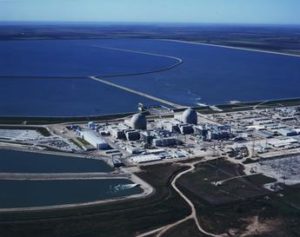Don’t Play Russian Roulette – Nuclear Reactors Should be Shuttered Due to Hurricane Flooding Risks

Guest Post submitted by Karen Hadden, Executive Director, Sustainable Energy & Economic Development (SEED) Coalition; Susan Dancer, President, South Texas Association for Responsible Energy; and Paul Gunter, Beyond Nuclear, Director, Reactor Oversight Project
Two nuclear reactors at the South Texas Project (STP) near Bay City, Texas should be shut down immediately in order to protect public safety in the wake of Hurricane Harvey, warned three watchdog groups today. With additional rainfall and increased flooding risks anticipated, the groups are calling on the Nuclear Regulatory Commission, the Governor of Texas, the Electric Reliability Council of Texas (ERCOT) – the Texas Grid Operator – and utility owners of the nuclear reactors to take action immediately.
“A county-wide emergency evacuation notice was issued last week for all residents to be out ahead of Harvey’s landfall,” said Susan Dancer, President of the South Texas Association for Responsible Energy. “In an even more aggressive move Sunday night, the Bay City Mayor and Matagorda County Judge issued mandatory evacuation orders effective immediately as Bay City is expected to be ten feet under water in a flood of a scale we’d never even imagined, much less experienced. I loaded up my animals and fled my Bay City home, not even taking time to take any possessions with me. As we tried to flee, water was already flowing across many roads. Our 911 system is down, as are our police and fire department’s phone and dispatch systems. No emergency services are available. All businesses are shuttered and most are taking on water. Refineries have shut down.
“It’s an outrageous and reckless decision that the nuclear reactors are still running. Why aren’t they in cold shutdown with only a skeleton crew? Where is the concern for employees and their families? Why is corporate profit being prioritized over caution and good judgment?” asked Dancer.
“Sometimes the unimaginable really happens, as we learned from the disaster in Japan. This storm and flood is absolutely without precedent even before adding the possibility of a nuclear accident that could further imperil millions of people who are already battling for their lives,” added Dancer.
“The Colorado River is cresting extremely high and flowing at 70 times the normal rate. It’s expected to approach flood stage (44 feet) near Bay City today, and exceed flood stage on Wednesday, Thursday and Friday.” said Karen Hadden, Director of SEED Coalition, “Flood waters reaching the nuclear reactors could make operation increasingly dangerous and the rains are expected to continue. There is plenty of reserve capacity on our electric grid, so we don’t have to run the reactors in order to keep the lights on. With anticipated flooding of the Colorado River, the nuclear reactors should be shut down now to ensure safety.”
“Both the NRC and the operator have previously recognized a credible threat of a severe accident initiated by a breach of the embankment wall that surrounds the 7,000-acre reactor cooling water reservoir,” said Paul Gunter, Director of the Reactor Oversight Project with Beyond Nuclear in Takoma Park, MD, referencing a 12-mile long earth and cement dike that surrounds South Texas Project’s Main Cooling Reservoir. The top of the cooling reservoir wall is at 67-feet above mean sea level with the reactor site situated below at 29-feet above mean sea level. The NRC is not providing a status report on the water level in the reservoir where the normal maximum operating level is 49-feet above mean sea level.
“However remote, it’s simply prudent that the operator put this reactor into its safest condition, cold shutdown,” Gunter concluded.
Utilities in Houston, San Antonio and Austin own the nuclear reactor and operate it as South Texas Project Nuclear Operating Company (STPNOC). South Texas Project is seeking to get re-licenced for 20 more years. “Are these nuclear reactors being run at increasing risk just to prove to the public that it can stay open?” asked Karen Hadden.
The watchdog groups pointed out that the Fukushima disaster showed the world that an energy asset can turn into a multi-billion dollar liability overnight. “We should do all we can to prevent such a mistake. Governor Abbott, the Nuclear Regulatory Commission and STPNOC should take action now to ensure that the reactors shut down now, before the deluge of hurricane floodwaters hits, risking an emergency situation,” concluded Hadden.